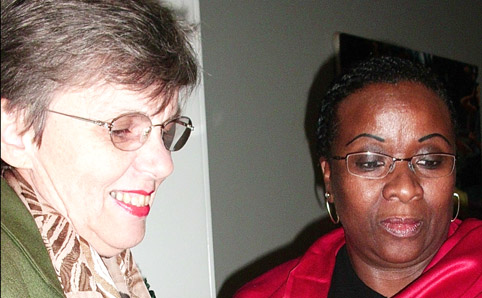Latest News Archive
Please select Category, Year, and then Month to display items
04 April 2024
|
Story Lunga Luthuli
|
Photo SUPPLIED
 Dr Juliet Kamwendo champions gender-inclusive climate action in Africa. Her expertise at the recently held AFR100 workshop highlighted vital steps towards sustainable and equitable development.
Dr Juliet Kamwendo champions gender-inclusive climate action in Africa. Her expertise at the recently held AFR100 workshop highlighted vital steps towards sustainable and equitable development.
Dr Juliet Kamwendo, Lecturer and Programme Director for Gender Studies in the Centre for Gender and Africa Studies at the University of the Free State, is spearheading efforts to integrate gender considerations into Africa's climate restoration agenda. Reflecting on her involvement, Dr Kamwendo stated, "This is particularly crucial, as women make up almost 50% of the population in Africa, and the depletion and degradation of land affect them disproportionately."
She recently served as a gender expert at the AUDA-NEPAD AFR100 workshop in Ouagadougou, Burkina Faso, from 25 to 29 March 2024. This initiative aims to restore forests and degraded land across Africa by 2030, with a focus on gender equality.
The workshop emphasised the integration of gender perspectives into the AFR100 project, acknowledging the disproportionate impact of land degradation on women. Dr Kamwendo's expertise highlighted the need to empower women in climate change interventions, addressing existing gender inequalities exacerbated by environmental degradation.
“Women – who are primarily responsible for household food security and water provision – bear the brunt of environmental degradation, leading to increased workloads, reduced income opportunities, and heightened vulnerability to climate-related disasters. Furthermore, the loss of forest cover and biodiversity further exacerbates the challenges faced by women, particularly in rural areas where they depend heavily on natural resources for their livelihoods,” added Dr Kamwendo.
Her participation highlights academia's crucial role in fostering inclusive and sustainable development, emphasising interdisciplinary collaboration to tackle complex environmental challenges. Through initiatives such as AFR100, stakeholders are working towards a more resilient and gender-responsive future for Africa.
Empowering teachers: Working with head, heart and hand
2011-06-14
 |
| Prof. JJE Messerschimdt (left) is the main supervisor and Dr KE Khabanyane the co-supervisor of this study within our Faculty of Education. |
The implementation of Curriculum 2005 brought about new demands in the teaching and learning of languages. In teaching languages, it is expected of teachers to focus on the development of the basic language skills which are embedded in the first four outcomes, namely listening, speaking and reading which is coupled with viewing and writing.
Although the learning outcomes are developed as an integrated whole, each one needs special attention. According to the NCS, the third learning outcome namely "reading and viewing", is stated as follows: "The learner will be able to read and view for information and enjoyment, and respond critically to the aesthetic, cultural and emotional value in texts".
Julia Ramabenyane researches The facilitative role of Grade 1 teachers in the development of reading skills in Sesotho. Empowering teachers: Working with head, heart and hand, a workshop for Grade 1 teachers, was held on 27 and 28 May in the Winkie Direko Building on our Main Campus. The aim of the workshop was to create an opportunity for teachers to better understand their role as facilitators in the development of reading skills.
In addition to the facilitation of Mrs Ramabenyane, Prof. Hasina Ebrahim (lecturer at the School of Social Sciences and Language Education), grade 1 teachers from Lesedi and Karabelo Primary Schools, as well as the HOD of Foundation Phase and three grade 1 learners from Karabelo Primary School in Rocklands, participated in the activities.
This workshop, together with other reflective group sessions, formed part of the emancipatory action research of Julia Ramabenyane's Foundation Phase PhD studies. This PhD study is titled The facilitative role of grade 1 teachers in development of readings skills in Sesotho.